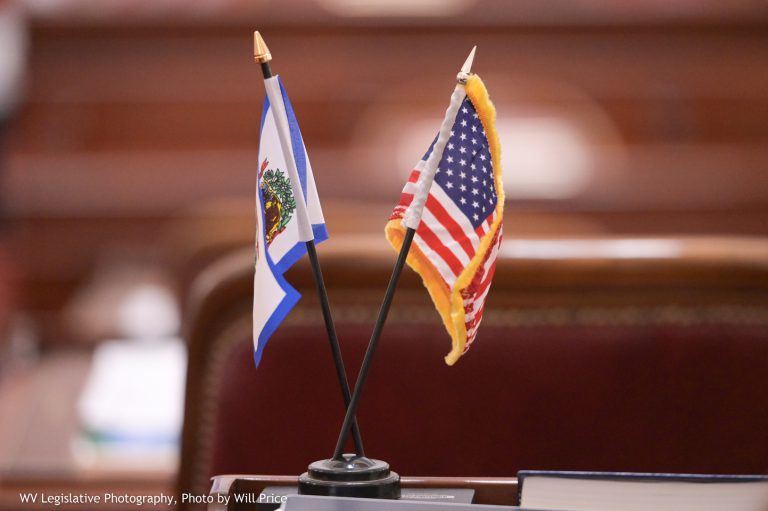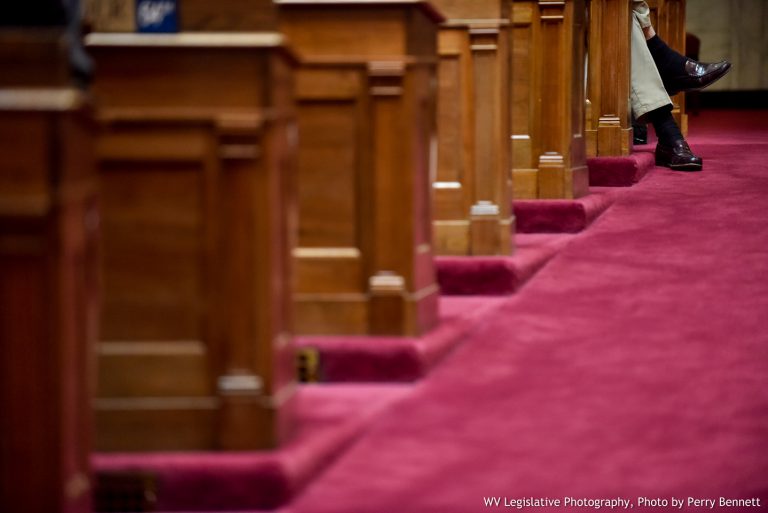As of 4 p.m. Wednesday March 2, 2005, the 22nd day of the Regular Session, 847 bills have been introduced in the House of Delegates. Of those, 12 have passed since February 24th and have been sent to the Senate for its consideration.
House Bill 2106 would allow the Bureau for Child Support Enforcement to withhold a portion of a worker’s compensation check. This would occur in situations such as when an individual is receiving compensation and owes unpaid child support. The Bureau for Child Support Enforcement would have specified amounts withheld otherwise payable to the recipient of support owed.
House Bill 2176 would expand the offense of intimidating a judge or magistrate to include harassment beyond the courtroom. This bill also would apply to times when the judge or magistrate are off duty and provide that the offender must have knowledge that the individual is a judge or magistrate. A person found guilty under this offense would be guilty of a misdemeanor and confined in jail for not more than one year and/or fined not more than $1,000.
House Bill 2186 would restrict the process of the involuntary commitment of addicted persons who are likely to cause serious harm to themselves or others. This bill would place restrictions on such involuntary commitments. Under this bill, a probable cause hearing may occur in the county where a person is hospitalized and video conferencing may be used for the hearing. The individual would only be involuntarily hospitalized until detoxification is accomplished.
House Bill 2329 would allow a judge to require a defendant to contribute monetarily, or through hours of service, to a local crime victim’s assistance program or juvenile mediation program which meets the following requirements: the program is approved by a circuit judge presiding in the judicial circuit; and, the program is a nonprofit organization certified as a corporation in this state and is governed by a board of directors. The contribution could be used as the sole source of punishment or a supplemental punishment.
House Bill 2477 brings provisions of the Code relating to personal property exemptions into conformity.
House Bill 2517 would specify safety requirements for transporting compressed gas on state highways. These requirements would include equipping the cylinder with securely attached metal caps of sufficient strength to protect valves from damage during transportation and constructing the cylinder so the valve is recessed into the cylinder. These requirements would not apply to propane gas used for household purposes.
House Bill 2593 would amend a portion of the West Virginia Code relating to land use planning; make technical corrections by repealing superceded sections; and, remove the requirement of Board of Zoning Appeals to pay attorneys’ fees on certain appeals.
House Bill 2623 would continue the Public Land Corporation until July 1, 2009. This Corporation was created to preserve, protect and enhance the State’s title to its recreation lands for today’s citizens, visitor users and future generations.
House Bill 2592 relates to the Design-Build Procurement Act. This bill would provide for reimbursement of expenses for the members of the Design-Build Board. The bill also modifies the duties and responsibilities of the Design-Build Board and provides for its continuation.
House Bill 2634 would provide for technical amendments in the West Virginia Code concerning the West Virginia Commission for the Deaf and Hard of Hearing. These changes would include deleting the requirement that the Commission must maintain a registry and census of persons who are deaf or hard of hearing and removing the hyphens in the name of the West Virginia Commission for the Deaf and Hard of Hearing.
House Bill 2666 would continue the Department of Health and Human Resources until July 1, 2006. The Department of Health and Human Resources is intended to help shape the environments within which people and communities can be safe and healthy.
House Bill 2667 would continue the West Virginia Commission for the Deaf and Hard of Hearing until July 1, 2009. Its mission is to advocate for, develop and coordinate public policies, and create regulations and programs to assure full and equal opportunity for persons who are deaf and hard of hearing in West Virginia.
A Sampling of Bills Introduced In the House
House Bill 2641 would allow for the election of justices of the Supreme Court of Appeals on a nonpartisan basis. The official ballots would not list any party affiliated with any justice who is running for the position of justice of the Supreme Court of Appeals.
House Bill 2649 would require basic training in Alzheimer’s and dementia in certain health care facilities. Training would be conducted under the supervision of a licensed operator and would include a basic understanding of Alzheimer’s disease and related dementia.
House Bill 2658 would require police agencies that hire graduate recruits within three years of the date they graduated from the State Police Academy to pay a share of cost of the training to the sponsoring police agency that funded the training.
House Bill 2663 would update the law relating to the digging, growing, harvesting and sale of Ginseng. Under this bill, a person digging, collecting, or gathering wild Ginseng on another person’s property must first obtain written permission from the land owner.
House Bill 2774 would establish multiple pilot programs, such as the Court Referral Officer Program, which would promote the screening, evaluation, education, treatment and rehabilitation of persons who are repeated substance abuse offenders.
House Bill 2833 would create the Better Sight for Better Learning Act. This act would provide for a state program that would issue a professional eye exam for each child in West Virginia prior to enrollment in grade school. The exam would be performed by a licensed optometrist or ophthalmologist.
House Bill 2842 would establish a program that would distribute cellular telephones to seniors and low income families, among others. These cellular phones would be used for emergencies only. The Commissioner of the Bureau of Public Health would establish a program for collecting used cellular telephones from retailers, wholesalers, individuals or any other source for reprogramming.








